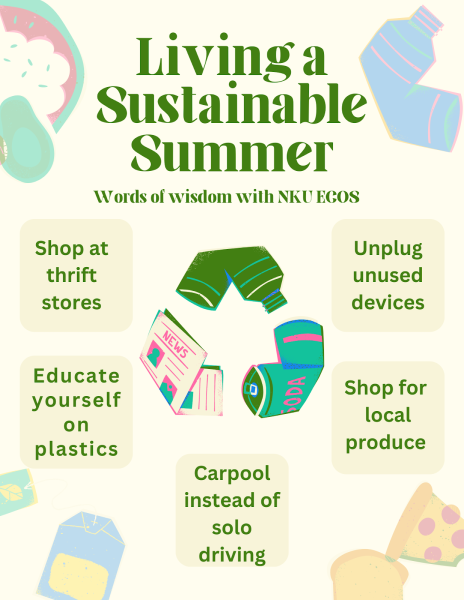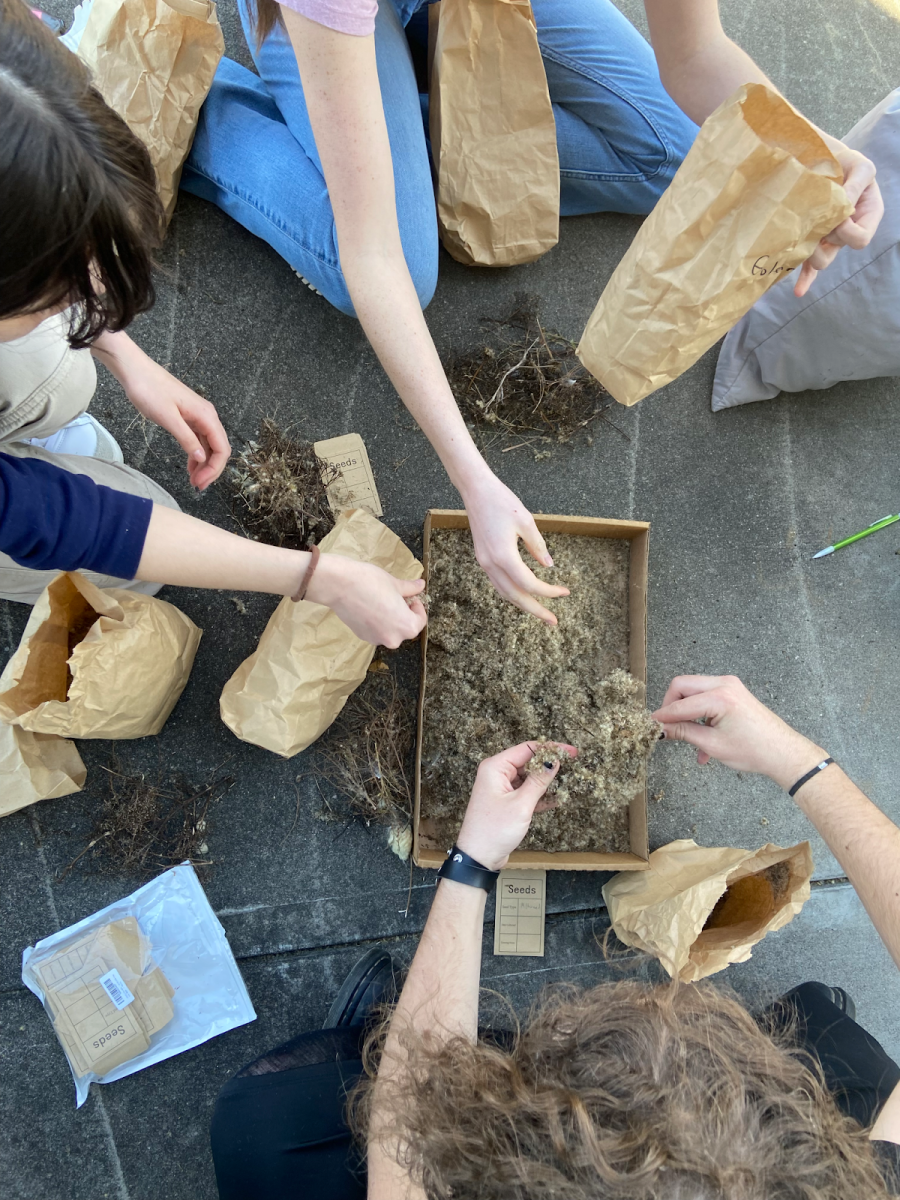As the approach of summer beckons us to spend more time outdoors, it also brings sweltering temperatures, single-use plasticware and greater stress on the planet’s resources.
To combat these environmental dilemmas, the Environmentally Conscious Organization of Students, also known as NKU ECOS, is on a mission to create strategies that will transform your summer fun with eco-friendly alternatives.
“Our purpose is not only to educate people on sustainability, but to teach better practices,” says junior biological science major and ECOS treasurer Jack Archie. “Our goal is to rebuild what we might’ve grown up thinking about the environment, such as what is recyclable and what’s not.”
NKU ECOS is one of two environmental science based clubs on campus that devote their time to community outreach, sustainable practices and environmental education. On campus, you might find them creating seed packets with native flora or giving away plants for Earth Day.
The members of ECOS work closely with NKU biology and sustainability to create innovative ways to leave a lasting impact on the campus community. Each member of ECOS has unique perspectives on how to make small lifestyle changes that create big results.
Here are a few things they suggested:
Educate yourself on plastics
The sizzling of a backyard barbeque is a common soundtrack of summer gatherings, but did you know most of the plastic food packaging will never be used again?
“One thing I notice more than anything is the amount of plastic in the trash. There’s millions of plastic bottles thrown in the recycling, but if there’s any kind of food on your plastics, it goes in the trash even at a recycling plant,” Archie said.
While the bottom of plastic containers has a familiar triangle symbol for “reduce, re-use, recycle,” not all plastic containers will have another life.
NKU ECOS advises to check the bottom of your containers for the resin identification code in the triangle symbol, before you purchase products. According to the Plastic Action Center, educating yourself on the types of plastics used in our daily lives can help you better understand what’s recyclable.
Within the symbol, there is a number that identifies the type of plastic used for the product. P1 and P2 are your standard bottles, such as milk jugs and cleaning product bottles. P5 and P6 plastics are the fruit containers at a grocery store, plastic cutlery and to-go coffee cups. The higher the number, the less likely they’ll be recycled.
Recognizing the significance of individual action in plastic recycling, Griff Jones, junior biological science major and co-vice president of ECOS, offered a practical tip. “If you take a little extra time to clean your bottles, you increase the likelihood it’ll be used again. If you don’t use plastics, you can use reusable bottles for your beverages or glass containers.” 
Travel with intention
Summertime is often characterized by vacationers eager for beachy getaways. However, energy consumption increases dramatically with travel. In addition to being mindful about plastic usage, NKU ECOS advises to travel with intention and sustainability in mind.
River Morfitt, sophomore environmental science major and NKU ECOS social media chair, weighs in on an effective strategy that reduces carbon emissions.
“If you and your friends are going to the same place, carpool. Biking is also an option, but for greater distances where you have to drive, be smart about it. If you have people that live really close to you, it’s better to drive together,” Morfitt said.
Transportation is one of the largest sources of carbon emissions. However, the drive to reduce emissions has inspired a range of alternatives that can be considered fun summertime activities.
For example, biking or walking decreases carbon emissions, provides health benefits and allows you to enjoy the outdoors more.
In line with sustainable travel choices, shopping and eating locally is a critical factor that reduces our carbon footprint. Visiting farmers markets is a sustainable summer activity that supports local farmers.
“My family tries to buy things locally so there’s less emissions. Buying locally ensures your food is fresher because there is less travel time to transport your food. Plus, your food will taste better,” says Jones.
Building on the theme of local sustainability, FUEL NKU offers a practical example of these principles in action.
During the summer, FUEL NKU will continue to operate by recycling fresh produce that otherwise would’ve been thrown away, ensuring that the campus community has access to fresh, national food, free of charge.
Conserve energy at home, and when you shop
Every year the temperatures rise. So does our electric bill. This direct correlation highlights a growing need to focus on our daily habits, especially during peak heat months.
“Be conscious of what you’re consuming, even if you think it’s small,” Morfitt suggested. “For example, use sunlight during the day instead of lights, and unplug things when you don’t need it.”
This approach to mindful energy consumption extends to other areas of environmental concern. For example, fast fashion is a leading contributor to waste and pollution.
Dillon Mayse, senior environmental science major and ECOS president, explains a proponent of sustainable fashion.
“Shopping at thrift stores is so much better for the environment, and for you. Most clothes in retail stores are made from plastic fibers, and they’ll fall apart after a few washes. And ironically you’ll find fast fashion pieces at thrift stores too, because they’re not wearable clothes,” Mayse said.
Shopping at second-hand stores plays a crucial role in energy consumption by reducing the demand for new clothing production and synthetic fibers.
Final thoughts for future generations
ECOS members said simple adjustments can ensure we live a sustainable summer. As college students, we are tasked with not only shaping our futures, but also setting the standard for sustainable practices in our community.
By integrating alternatives – whether it’s opting for public transport, reducing energy consumption, educating ourselves on plastics, shopping locally or choosing to shop second hand – we participate in a cycle that rebuilds our previous beliefs.
Jones proudly summarizes how we have a duty to foster a culture of sustainability.
“In college you’re constantly thinking about your future. It’s important to incorporate sustainable practice in your life, for future generations to follow,” he said.
For more information on environmental efforts on campus, contact ecos@nku.edu or reach out on their Instagram.


